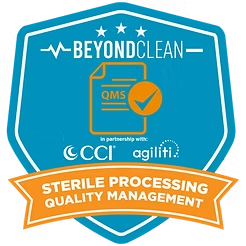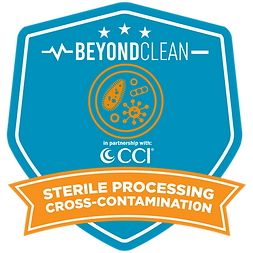Microcredentials
Quality Management Microcredential
ABOUT THE MICROCREDENTIAL
We’re excited to introduce the newest Sterile Processing microcredential in partnership with the Competency & Credentialing Institute and Agiliti. The Sterile Processing: Foundations of Quality Management Systems microcredential emphasizes critical thinking and application skills for understanding the fundamentals of process components, their integrations within Sterile Processing workflows, and the theory and practice of historical influencers of quality management concepts. Here is a brief description of the components.
Course Outline
Required Modules (must complete all 9 of the following to receive microcredential)
- Knowledge Assessment: Quiz
- Skills: Lesson 1 - The Process Approach to Managing Quality
- Skills: Lesson 2 - Influencing Quality Management in Theory and Practice
- Skills: Lesson 3 - Quality Management in Sterile Processing Workflows
- Skills: Lesson 4 - Analysis of Risk and Proactive Problem-Solving
- Skills Lesson 5 - Failure Modes and Effects Analysis (FMEA): Instrument Damage Prevention Project
- Skills: Lesson 6 - Sterile Processing Work Systems Analysis Project
- Attitude/Behavior: Lesson 7 - Essential Job Functions of Sterile Processing Quality Professionals
- Post-Course Survey- Likert Scale
Upon successful completion of the course, learners receive:
- Electronic certificate of completion
- Sterile Processing: Foundations of Quality Management Systems digital badge
- 50 points toward CNOR/CSSM/CNAMB recertification requirements
- 10 CEs through HSPA and CBSPD
Cross-Contamination Microcredential
ABOUT THE MICROCREDENTIAL
We are excited to introduce the first-ever Sterile Processing microcredential in partnership with the Competency & Credentialing Institute. The Sterile Processing: Cross-Contamination microcredential will verify, validate, and attest that specific skills and competencies have been achieved in medical device reprocessing decontamination practices. Here is a brief description of the components.
Part 1 – Assess and Analyze Assess your knowledge and learn through analysis.
- Knowledge Assessment
- Survival Under Siege: The True Story of Biofilm Success
- Analysis of Bioburden
- MRSA: A Personal Case Study
- Compromising Care
- Cross-Contamination End of Course Survey
Part 2 – Learning Activities Choose from multiple activities to complete your learning experience.
- Investigative News Review
- Pathogenic Microbial Discovery
- Patient Experience – Healthcare Associated Infection
- Minimizing Contamination using Personal Protective Equipment
- Microbiology Terms and Definitions
Upon successful completion of the two-part course, learners receive:
- Electronic certificate of completion
- CCI’s Sterile Processing: Cross-Contamination digital badge
- 50 points towards CNOR/CSSM/CNAMB recertification requirements
- 10 CEs through HSPA and CBSPD
Microcredential Faq
What is the Competency & Credentialing Institute?
Why did Beyond Clean choose to partner with CCI for this industry-first microcredential?
What is a microcredential?
Once I earn a microcredential, what can I do with it?
What is the difference between a microcredential and a certification?
How long will this coursework take to complete?
Is this program similar to a college course?
What does this program cost?
About the Course Developer/instructor

“Working for a higher purpose fuels my internal locus of control and energizes me to meet high demands. I chose a career in public health because I want to make a difference in people’s lives and be an active participant to promote best practice. I have several years of experience working as an Instrument Technician for surgery at a local hospital. Each day I interacted with doctors, and nurses and my role was vital to the care they provided.
Public health standards development and education take this service to the next level, being concerned with the systems and processes that directly impact patient saftey. I am an efficient, and effective healthcare professional who is committed to continuing leadership development. I enjoy being depended upon, and management is a natural function that I gravitate toward with a confident, yet compassionate approach. I believe that leadership in public health embodies the culmination of servitude, professionalism, expertise, and compassion; therefore, I see influential advocacy for infection prevention as an extension of who I am.”
“I love to challenge myself in my profession and this has given me another opportunity to do just that! I hope this is just the start of more to come for us in this industry. I believe this should be required for those of us in Sterile Processing. It allows you to pause and think about the processes we do day in, day out. Places a patient behind everything we do and a reminder that we are technicians, not machines. Complacency is real and dangerous. We should be checking ourselves through education and this is the perfect opportunity to do just that!”


